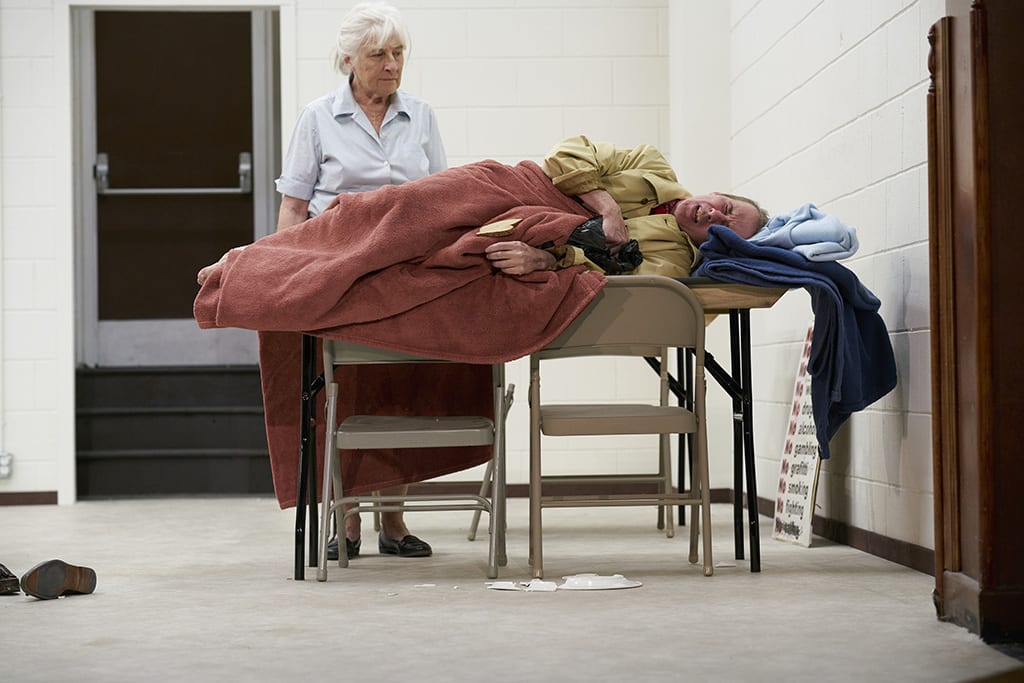Good Samaritans by Richard Maxwell, currently playing at the Abrons Art Center on an uncharted corner in lower Manhattan, is set in a rehab center’s bleak basement. The Playhouse Theater had the quaint feeling of a high school auditorium. It was charming, really. I enjoy coming to a place like that. It makes me feel like I might be about to see an unknown gem of a show, unlike the 1,000 seat theaters uptown. The spare set’s realism encouraged that optimism — a cinderblock square with rows of flimsy folding tables and chairs, a small corner kitchen, and the kind of bright florescent lighting that could drive a person crazy.
But my hope for the show ended almost as soon as the action started.
Rosemary, an older rehab counselor dressed in plain, institutional garb, enters, stares up at the street-level window and warbles, “I will try not to be sinful.” She’s not a singer – but maybe the realism is the point? The next lines of dialogue brought that idea and all my hopes for the show to an end.
Never in my life of theater attendance have I seen flatter, more monotonous, and less emotive delivery. And last month I happily saw Guys & Dolls at a suburban high school. Rosemary and her patient Kevin spend 90 minutes talk-shouting lines at each other with no variation for pacing or content. It felt like they were standing in front of the mirror, running the lines for memorization.
The plot and its characters earned none of its claimed emotions. And the show is randomly peppered with music so simple it felt as flat as the on-stage performances – despite fine work from the guitar-piano duo. Why is this a musical? I never settled that question. And why is there a romantic story? Suddenly Kevin talk-shouts that he wants her. Unbelievably, she falls for him. How did that happen? They have an unconvincing and uncomfortable sex scene on a cafeteria table standing in as a bed throughout the piece, and soon he’ll sneak out having stolen from Rosemary and (I think I’m supposed to believe) broken her heart. So, it was all a grift? Maybe. She wasn’t terribly surprised or saddened, and seemed to then begin anew with another patient who awkwardly sits at a table slurping soup while Kevin and Rosemary share their final words. “My grief is passive men,” she shares.
I kept wondering—am I missing something? Is this piece actually a successful modernist or absurdist commentary that I just don’t get? Perhaps on shallow love, or vices and recovery, or the meaning of service and selflessness? Maybe, but I’m unconvinced. The show’s success with other reviewers and even the Obie awards suggests that I must have missed something– but that staggering ambiguity is enough to make it just too tedious.
Leaving aside the actors’ monotonous staccato delivery, nearly absolute emotionlessness, the set held all the night’s promise. But the very realistic space that housed these terrible performances was not used literally. We were still asked to imagine it as both upstairs and downstairs, as settings of bedroom scenes, office scenes, cafeteria scenes.
I found the evening depressing, and not because I was in any way moved by the story or transported by the stark light of the institutional-looking set, but because I pitied the musicians whose talents surely outpace the show and the audience members whose $25 paid for their nap in a fully lit house.

